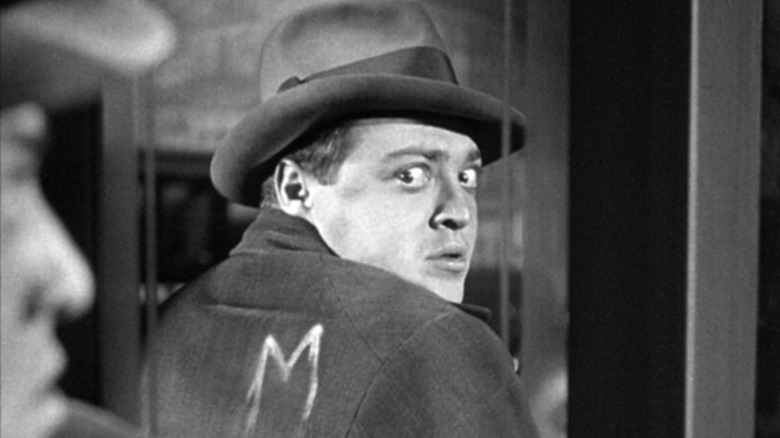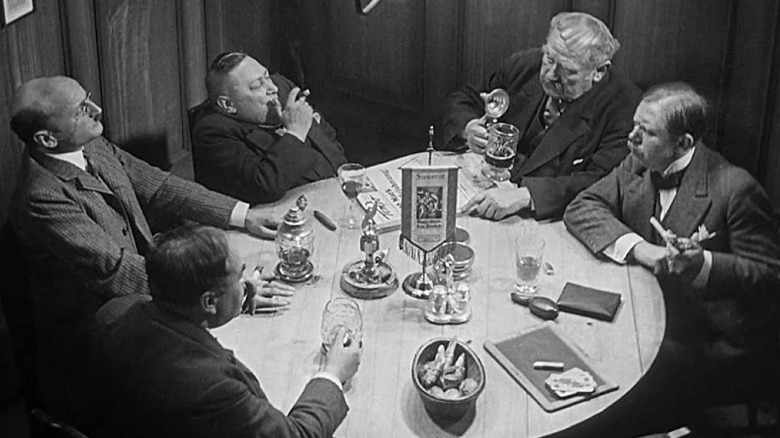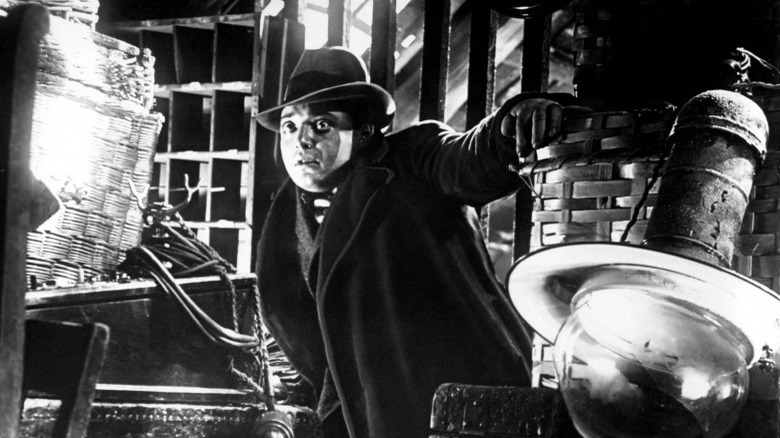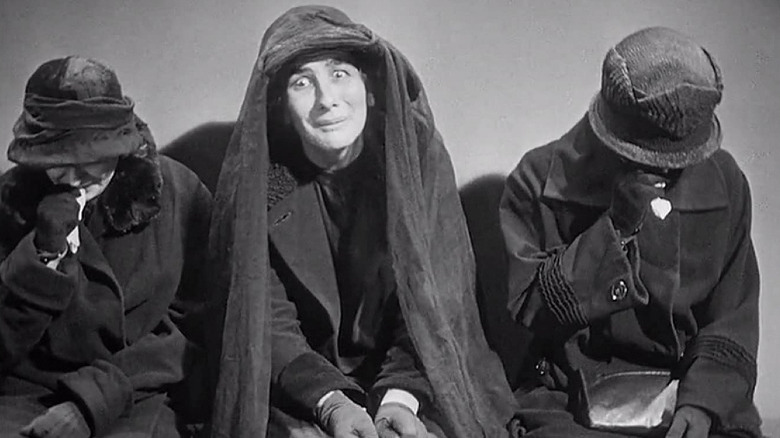M Ending Explained: This Won't Bring Back Our Children
Long before Hannibal Lecter, Patrick Bateman, and Norman Bates, there was Hans Beckert (Peter Lorre in his breakout role), the child murderer at the heart of Fritz Lang's landmark 1931 German Expressionist thriller "M." More than 90 years later, the film is as chilling and upsetting as it ever was, despite never actually showing any of Beckert's horrible, vile deeds onscreen. All it takes is the sound of the character whistling "In the Hall of the Mountain King" to set you on edge.
Much like Alfred Hitchcock's "The 39 Steps" shaped the framework for person-on-the-run thrillers, "M" paved the way for the serial killer genre and variations on the theme. But what's fascinating about the film — aside from Lorre's creepy, clammy turn and the way Lang uses unnatural shadows, eerie reflections, and cramped interiors to create a setting as warped as the killer at the heart of the movie — is its lack of interest in Beckert. Unlike so many of the police procedurals and true-crime dramas that would follow in its wake, "M" plainly sees the villain of its story as a symptom of a society rotting from within, and not a disease in and of himself.
If this wasn't already obvious by the point the film's third act rolls around, it is in its closing moments. What could've readily been framed as a triumphant ending instead serves as a warning about the direction Lang saw the world was headed in the early 1930s — a warning that applies just as much to the present-day.
A mirror for society
"M" opens on a group of kids in Berlin playing a game involving a macabre nursery rhyme (is there any other kind?), all while parents wait anxiously outside of a school. The city is on edge, and for valid reason: Several children have gone missing recently, with signs around Berlin offering a reward to anyone who can find the culprit. It doesn't take long for Beckert to strike again. After he does, he taunts the local newspapers with an anonymous letter, promising his reign of terror will continue.
At this point, Beckert vanishes until the second half of the film, the plot shifting focus to the people of Berlin. And what do we see? Sensationalist reports cause the public to panic. Wealthy men and politicians smoke like chimneys in crowded rooms, demanding results yet doing almost nothing to help. Police raid hot spots for known law-breakers, not so much with the intent of finding Beckert as much as wanting to seem like they are taking meaningful action to stop him. Even the bosses who run Berlin's crime rings, the Ringvereine, are upset. Less so about kids being killed, not really, but this is all bad for business.
In the same way some of Stephen King's best work peels back the polite facade of '50s America to reveal the sordid reality beneath, "M" uses the story of a hunt for a child-killer as a mirror to show post-World War I Germany what it had become. There's nothing to admire or respect about the unpleasant, powerful men of Berlin and how they react to Beckert's killings. Their world is a corrupt one, their main concern being to restore the status quo prior to the arrival of this "monster." Surely he's the real problem, they seem to tell themselves.
Who's really on trial here?
Even with limited means for hunting Beckert, it's not exactly hard to catch the guy. He's far from cautious about the way he commits his crimes, reusing the same bag of tricks every which way he goes. (It turns out a serial killer may not be an entirely rational person.) By the time a blind vendor recognizes his whistle and alerts others to his presence, it takes one of his pursuers branding his jacket with a chalk "M" for "Mörder" (the German word for "murderer") for Beckert to realize he's in trouble.
After a long chase in which Beckert spends most of the time huddled in the attic of a large building, the criminal mob takes the child-murderer to an old distillery to face an illegal trial for his crimes. Rather than balking in the face of such opposition, Beckert points an accusing finger back at them:
"Who are you anyway? Who are you? Criminals? Are you proud of yourselves? Proud of breaking safes or cheating at cards? Things you could just as well keep your fingers off. You wouldn't need to do all that if you'd learn a proper trade or if you'd work. If you weren't a bunch of lazy b******s. But I... I can't help myself! I have no control over this, this evil thing inside of me, the fire, the voices, the torment!"
Obviously, the film isn't asking us to side with someone who murders children, nor is it, per se, suggesting there aren't greater systematic forces at play fueling all these criminal enterprises in Germany. But after watching how the city of Berlin responded to this crisis, it's clear these accusers see Beckert as a scapegoat for both their personal failings and those of the society around them.
And the verdict is...
Just before the mob can kill Beckert, the police show up to arrest him, along with all the other criminals on the premises. The film ends with a panel of actual judges on the verge of delivering the verdict at Beckert's official trial, only to cut to three grieving mothers waiting in the gallery outside the courtroom. "This won't bring back our children," one of them cries, all but breaking the fourth wall as she calls on the parents of the world to protect their kids.
One could interpret this scene in different ways, as many people have. It could be seen as a critique of the death penalty and how it's incapable of delivering real justice, as was a topic of much debate in Germany during the Weimar Republic era in which Lang directed the film. In a more literal sense, this closing shot makes "M" a proto-"stranger danger" cautionary tale meant to scare women into keeping a closer eye on their children.
But in the context of the rest of the film, this ending reads as a final condemnation of the place Lang had come to call his home for well over a decade. There's nothing flattering or loving in the portrait the director paints of pre-WWII Germany, a country where the Nazi Party was rapidly gaining more power. Lang, who was raised Catholic despite his mother being born Jewish, would leave both his wife and "M" co-writer Thea von Harbou (who pledged her loyalty to the Nazi regime) and Berlin for good by 1933.
If Lang had any lingering fondness for Germany when he departed, it doesn't show in "M." The film might not sympathize with Beckert but it also doesn't despise him the way it does the "respectable" crooks who hunt him.



